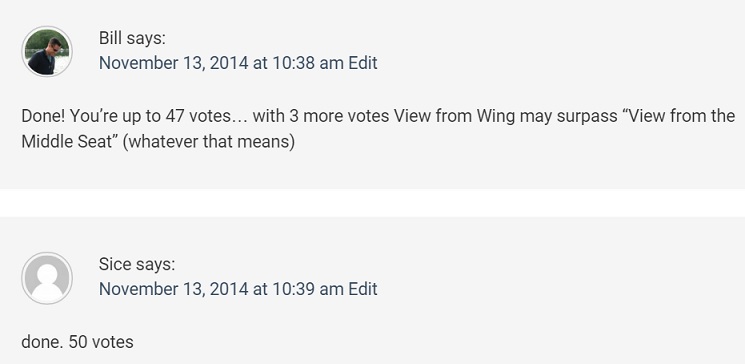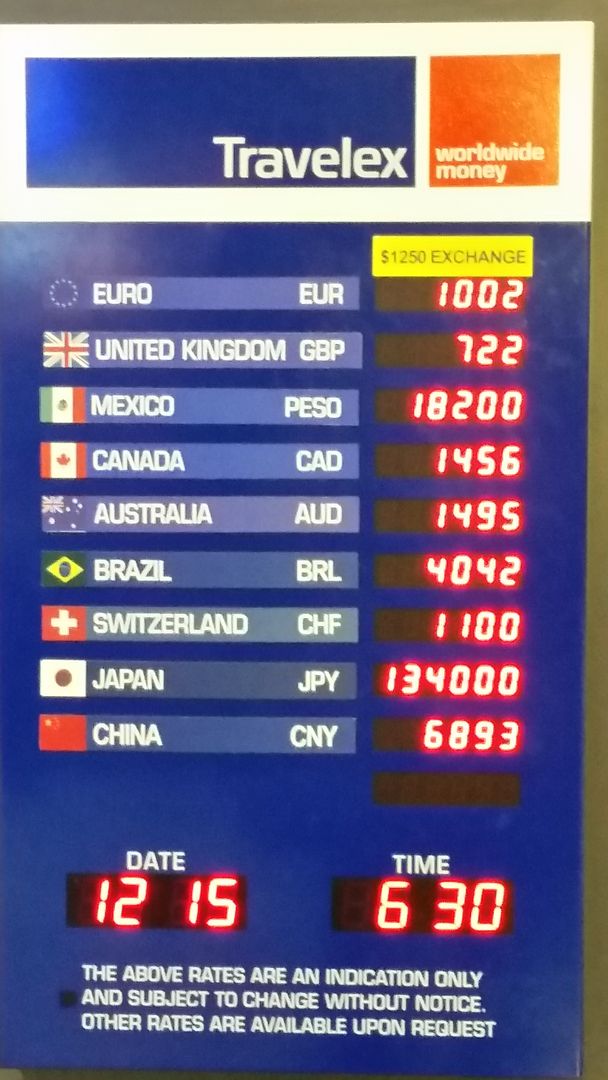News and notes from around the interweb:
- Flying Business Class as a Millennial (HT: Joel G.)
- Christopher Elliott‘s blog poll is back. Last year much to my surprise he included View from the Wing in the nominations for Best Travel Blog. A commenter here declared they were the 50th vote for me in his poll — so he docked my total 50 votes claiming that a reader here had ‘said’ they voted for me 50 times (Elliott also spent a day in the comments here bashing readers). This blog still garnered the most votes. So he declared there would be no winner. Good luck to the ‘winners’ of in this year’s voting!

- Following up on the TSA’s change to make your ability to opt out of nude-o-scopes entirely at their discretion rather than yours, reader Reid F. shares this:
Just spoke to my Congressman’s office.. They spoke to the TSA, and they were told that nothing has changed UNLESS you are on the watch list. If you are on the watch list, you will no longer be allowed to opt out. My Congressman is pushing them to make that clearer via their release. He will be getting back to me again soon.
These lists, of course, are both useless and perverse.
- Here’s something that’s never occurred to me before: If you’re allowed to check in for an international flight but are turned away at the gate, you have to return your duty free purchases because they’re no longer duty free.
- Germany strikes down online travel agency agreements that require hotels to make their best price available through the channel. On the one hand, that limits the ability to hotel websites to offer consumers lower prices, it limits competition. On the other hand, it means less price transparency, more complexity, and the need to search multiple sites to get the best prices.
- Math is hard. Last week I took this photo near my departure gate of a Travelex currency exchange booth. You know you’re getting hosed if for no other reason than they’re listing how much foreign currency you can buy with $1250 rather than $1000. They ‘hide’ the bad exchange rate with math.



I know I’m biased, but how does Best Western and Accor make Elliott’s most but Hyatt doesn’t?
In my experience, you don’t even have to look at the numbers. Travelex ALWAYS hoses you.
Elliott is pretty much a charlatan. He has some resources for effectively making complaints, and agrees about the TSA, but otherwise has little to offer the well informed traveler. I never heard of most of those blogs. May as well check a couple out over the holidays.
I find that the easiest way to find out whether a forex kiosk is basically fair is to approximate the percentage between BUY and SELL. Two or three per cent on common, easily convertible currencies is OK (banks have to live too), much more, and you are being cheated. That said, when you’re dealing with more exotic ones, be prepared to be soaked. The question is how much!
what are you doing exchanging money?? shouldn’t you be using those international fee free cards? 😉
BUT, how about a blog post about the BEST way(s) not to get hosed when exchange money for international travel? While credit cards cover most international expenses, it can be nice to have a little bit of cash (i’m sure there are blog posts about this out there, i’m just too lazy to search right now).
+1 to avoid Travelex. The only time I look at their booths is for entertainment value. Never change money there. You’re usually better off at the hotel or other ripoff places.
Elliot is the lamest blogger on the planet. Hope you crush it once again in his poll and that he makes up another sorry excuse to give you the credit you deserve.
The easiest way to bypass the ripoff money exchanges is to carry a Schwab debit card that has no fees anywhere, and they even refund ATM fees charged by the ATM owner worldwide. Plus it’s a lot faster to hit an ATM than deal with the exchange folks.
Always always use your cash station ATM withdrawal. Take out the max allowed and it is the easiest way to get local currencies
Always use credit cards to get money or debit cards. I use my debit card every time I am overseas and the exchange rate is almost perfect. Just remember to tell your bank you are leaving!!! Also the black cards and Amex platinum have the same features. If I want to have cash access.
I just looked at the Chris Elliott poll results so far and USA today is leading in the travel resource area. That should tell you something. I bet half the votes on the poll came from your blog posting.
I second what Larry Abramson commented above – look at the Buy and Sell rates and if the difference is very small, you’ve found a good exchange rate booth.
In recent years, I’ve found that withdrawing cash using an ATM bank debit card is becoming less attractive – one for security reasons, another for foreign banks charging high exchange rates or fees. Some banks may say that they don’t charge any fees but it’s actually hidden in the poor exchange rate that you get.
I think it would benefit everyone if some blogger would start an on-going page with the best method of currency exchange for popular countries as I’ve found that 1 size (i.e. solution) does not fit all.
FWIW, I use the OANDA Currency Exchange app on my phone to double check how much I am really getting ripped off. The nice thing about OANDA is that it remembers the rates since last time you checked. So if you check just before you leave the US and then when you are at the kiosk overseas, you can double check without connecting to the phone network. It also does a good job of flipping the two currencies as well as having options for typical CC, exchanage kiosk, and interbank rates.
and +1 @Live4Sights… There are some places I will never use an ATM card – Nigeria, etc.
I think the bigger problem is being in Nigeria in the first place.